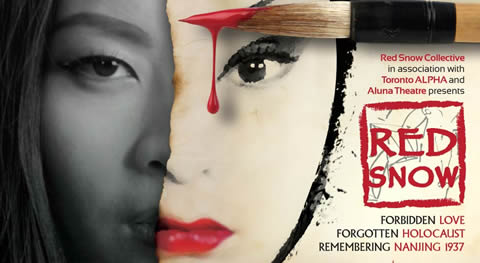A massacre that happened almost 75 years ago, before the start of the Second World War, has inspired actor Diana Tso (BA 1990 NEW) to write and produce her first play.
Beginning in December 1937, during a six-week period, the Japanese army killed an estimated 300,000 Chinese people, and raped tens of thousands of girls and women. Known as the Nanking Massacre, these atrocities took place during the capture of Nanking, China’s then-capital city, during the second Sino-Japanese War. When Tso saw a documentary about the horrific events in 1997, she felt compelled to write about what she’d seen, to make more people aware of what she calls a “forgotten holocaust.” “It’s still not widely spoken about,” she says. There is an underlying culture of dissension between the Japanese and Chinese, but Tso felt that her generation was mostly unaware of how deep the pain ran.
What continues to astonish Tso is the lack of awareness that still exists. Survivors of the massacre are often unwilling to talk about the traumatic events they saw or experienced, and many history books worldwide are incomplete or don’t mention the massacre at all, she says. In the interest of telling the story of her ancestors, Tso decided to use the medium she knew best. “The stage is my public arena to voice stories and truths, and hopefully change or inspire,” she says. After spending years working on her story, Tso is excited for the debut of her play.
Red Snow is the story of a Chinese-Canadian woman who has recurring nightmares about her grandparents. The dreams are always in the form of a Chinese opera, but strangely, there is no singing. The character, Isabel, knows that her grandmother died during the war, but her grandfather refuses to talk about what happened. “She gets to the point where she can’t live like this – she has to know the truth,” Tso says. Isabel travels to Nanjing to discover their stories, and on her journey she falls in love with a Japanese-Canadian man whose past is intertwined with her own. “It’s through their love that they struggle and they find a way to reconcile the past with the present,” Tso says.
The events of the Nanking Massacre are still incredibly controversial and divisive. Historians throughout the world disagree about the number of victims and the degree of brutality, and some deny that it happened at all. But Tso does not see it as her role to resolve the issue for her audience. “As an artist, I’m not here as a history teacher,” she says. “This is something that should touch everyone’s heart; it’s about racism, prejudice, war and how we overcome.” Tso believes that in war there is no black-and-white; and she isn’t interested in demonizing anyone. “It’s about dialoguing, and working brick by brick to take down the walls and build bridges.”
Tso went back to Nanjing (as the city is now widely known) in 2008 and spoke with survivors. One man told how his mother was stabbed in the chest by a soldier. She lay bleeding to death, but asked her son to go find his baby brother so she could breastfeed him. He found the baby crying, and crawling back and forth on snow stained with blood, which gave Tso the title of her play.
Regardless of the darkness we may unearth, Tso insists that we can never talk too much about the past. “We have to learn from the past and be inspired by the past,” she says. After all, “who are we without our stories?”
Red Snow opens January 14th at Theatre Passe Muraille.
Recent Posts
U of T’s Feminist Sports Club Is Here to Bend the Rules
The group invites non-athletes to try their hand at games like dodgeball and basketball in a fun – and distinctly supportive – atmosphere
From Mental Health Studies to Michelin Guide
U of T Scarborough alum Ambica Jain’s unexpected path to restaurant success
A Blueprint for Global Prosperity
Researchers across U of T are banding together to help the United Nations meet its 17 sustainable development goals







One Response to “ Remembering the Nanking Massacre ”
What about the Armenian genocide no one talks about? The Turks killed 90 per cent of the Armenian population and it is still illegal to talk about it in Turkey.